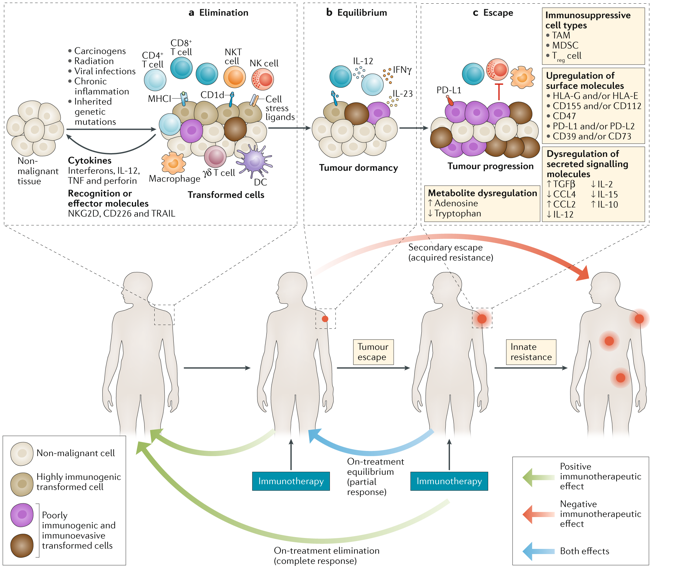Nature Reviews Clinical Oncology ( IF 81.1 ) Pub Date : 2018-12-06 , DOI: 10.1038/s41571-018-0142-8 Jake S O'Donnell 1, 2, 3 , Michele W L Teng 2, 3 , Mark J Smyth 1, 3

|
Anticancer immunotherapies involving the use of immune-checkpoint inhibitors or adoptive cellular transfer have emerged as new therapeutic pillars within oncology. These treatments function by overcoming or relieving tumour-induced immunosuppression, thereby enabling immune-mediated tumour clearance. While often more effective and better tolerated than traditional and targeted therapies, many patients have innate or acquired resistance to immunotherapies. Cancer immunoediting is the process whereby the immune system can both constrain and promote tumour development, which proceeds through three phases termed elimination, equilibrium and escape. Throughout these phases, tumour immunogenicity is edited, and immunosuppressive mechanisms that enable disease progression are acquired. The mechanisms of resistance to immunotherapy seem to broadly overlap with those used by cancers as they undergo immunoediting to evade detection by the immune system. In this Review, we discuss how a deeper understanding of the mechanisms underlying the cancer immunoediting process can provide insight into the development of resistance to immunotherapies and the strategies that can be used to overcome such resistance.
中文翻译:

癌症免疫编辑和对基于 T 细胞的免疫疗法的抗性
涉及使用免疫检查点抑制剂或过继性细胞转移的抗癌免疫疗法已成为肿瘤学中的新治疗支柱。这些治疗通过克服或缓解肿瘤诱导的免疫抑制发挥作用,从而实现免疫介导的肿瘤清除。虽然通常比传统和靶向疗法更有效且耐受性更好,但许多患者对免疫疗法具有先天或获得性耐药性。癌症免疫编辑是免疫系统可以限制和促进肿瘤发展的过程,该过程通过三个阶段进行,称为消除、平衡和逃逸。在这些阶段中,肿瘤免疫原性被编辑,并获得了使疾病进展的免疫抑制机制。对免疫疗法的抵抗机制似乎与癌症使用的机制广泛重叠,因为它们经过免疫编辑以逃避免疫系统的检测。在这篇综述中,我们将讨论如何深入了解癌症免疫编辑过程的潜在机制,从而深入了解免疫疗法耐药性的发展以及可用于克服这种耐药性的策略。





















































 京公网安备 11010802027423号
京公网安备 11010802027423号